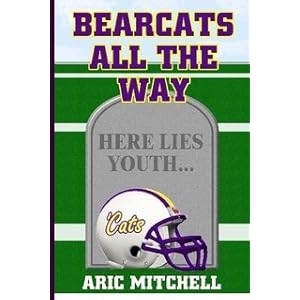Of course, most of the fault lies with me. Books don't sell when you're too shy about pulling the marketing trigger, and for the longest time I suffered from just such a malady. Today, I'm considerably less shy about discussing my work. Earning a few paychecks on your writing ability will give you the confidence that you need to stop making apologies for your career choice. Nevertheless, the book has stagnated, and honestly, I'm okay with it. I've moved on to other projects, and I've grown considerably as a writer since then, both in education and practice.
I'm very proud of "Bearcats All the Way," but at the same time, if I thrust all of my marketing efforts into the past, there wouldn't be much of a future to take hold of, would there? This reality brings to mind a generally negative word that is, for me, somewhat positive in connotation: apathy. When one is apathetic about something, they just don't give a rip. Apathy is really a two-sided coin not unlike the one Two-Face flips in the Batman comics to decide whether you live or die.
(I know--geek!)
Heads, you stop caring so much that you refuse to participate. That can be on writing projects, homework assignments, or the plant/office/professional football organization, where you work. Tails, you're such a forward thinker that you know when to pull the plug on a project and move on to the next big thing with an enhanced set of skills to accompany you on the journey.
To illustrate:
- Putting away an old writing project and focusing on something new with renewed enthusiasm and vigor--good.
- Shutting down your football organization because you only stand to profit $5 billion instead of $7 billion in a down economy--bad.
(That's the sort of thing your fans hate you for, and I'm looking at you, owners.)
So when do you know if a project has run its course? Do you look at the dwindling sales numbers? Do you stop marketing because of a change in marketing trends--like when you wrote that young adult wizardry book, Harry Potter was all the rage, but now even J.K. Rowling is moving on to other things? Do you stop if your book gets a couple of 1-star reviews on iTunes, or when you read an anonymous Internet troll's diatribe on why you're the most illiterate idiot on earth? When is it really time to pull the plug?
For me, the process is very organic. You can't be instructed on when the time is right, but you can be told what to look out for. You'll know it when it happens, but you may feel that you need permission to move on without being considered a failure. Guess what? Everyone fails. Your critics are probably the biggest failures of all because they cannot actually "do." They haven't the courage or perhaps the ability to put themselves out there for the world to see. Chances are they work a job they hate, which may or may not pay well, and pieces of their souls die each day they have to go in and punch a clock. Don't worry about them. Worry about whether or not you want to spend time with the project anymore, and whether or not it still excites you enough to talk about it when you're asked the all important question: What kinds of things do you write? The moment I decided to no longer answer that question with "Bearcats All the Way," was the moment I decided it was time to refocus my efforts.
That's not to say the book isn't worth a read. You could probably polish it off in one day, it being summer and all, wink-wink. But I'd much rather focus on future writing plans because I am a writer, read, "one who writes." Not one who has written. "Bearcats All the Way" has been written. Now on to other things!
